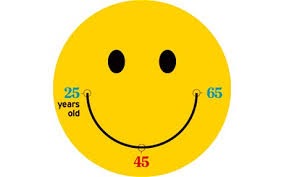Which period of life was your happiest?
Chances are you’d say young adulthood. Your body is in great shape, and friends and family surround you. The world is your oyster.
However, research suggests that the older you get, the happier you become. Despite a decline in physical and cognitive abilities, your mental state improves. The “Happiness curve” best illustrates this phenomenon.
What is the Happiness Curve?
Though seemingly paradoxical, the happiness curve is tied to the natural pressures of young adulthood, which contribute to an atmosphere of stress and uncertainty. Questions of how to:
• Find the right romantic partner
• Choose an enjoyable yet lucrative career
• Transition to financial stability
constantly plague the minds of young adults.
Since the “self” is still forming in this stage of life, searching for a core identity feels emotionally consuming. Conversely, older adults have typically cemented their identity, leading to more emotional stability and achieving the happiness curve.
For this reason, the happiness curve is a kind of “U-curve” (or, as some have whimsically modeled it, a smiley face) – with physical and cognitive health having a surprisingly inverse relationship with happiness.
Remarkably, people entering their 20s and 30s reported having the highest stress, depression, and anxiety among all age groups. Simultaneously, they also have the lowest levels of contentment and well-being. In contrast, people in their 50s and 60s have much higher life satisfaction, emotional stability, and positivity than their younger counterparts.
The Happiness Curve
The happiness curve is attributed to the ability of older people to focus on the positive aspects of situations. As you grow older, you’re affected by adverse conditions less than younger people and are more likely to focus on your successes. For example, an evening spent reading stories to grandchildren significantly outweighs the annoyance of achy knees or weak glasses.
These findings support the principles of socio-emotional selectivity theory (SST), which refers to the relationship between increased happiness and a limited timeline. Happiness, according to SST, is an individual’s confidence in their future. Since an unpredictable future confronts younger people, they focus their energy on combating whatever challenges lie ahead, such as going to college, completing a summer internship, or getting into perfect shape.
This ambiguity makes young adults less embedded in the “now’, delaying internal emotional satisfaction. Therefore, the happiness curve is at its lowest at this point in life.
Conversely, when facing a shorter period, a person will focus on the present, prioritizing emotional satisfaction over preparation for the future. Happiness, in turn, becomes the biggest priority for the aging adult, as do values such as love, family connection, and self-reflection. The happiness curve is complete.
Perspective: Essential to the Happiness Curve
As you grow older, you acquire wisdom by learning lessons from your past. Knowledge increases the sense of self and contributes to the notion of “successful aging.”
Wisdom allows you to have a meaningful relationship with your past, using memories as a lens to view your identity. This accumulation of memories gives you perspective, a key ingredient in the happiness curve.
As you remember countless embarrassing or negative moments (like when you spilled yogurt on a breakfast date), you also remember that none of it mattered. Though your younger self felt humiliated, those moments are now funny.
Age shows us that even losses that seem incredibly consequential at the moment, like breakups, are ultimately minor in the grand scheme of life. Older people focus on happiness instead of heartbreak when reflecting on a past love. Filtered by nostalgia goggles (looking at past events positively), the past becomes a harbor of positive recollections.
Record Memories on My Stories Matter
Thanks to the happiness curve, it only goes up from here! In the words of David Bowie, “Aging is an extraordinary process where you become the person you always should have been.” So don’t let the fear of aging worry you.
My Stories Matter is a great platform to start recording the lessons you’ve learned along the way. You can:
• Collaborate with friends and family
• Organize your stories and memories with our timeline feature
• Answer prompts that ask you specific questions to get started
Your information is kept secure and private, unlike other social media apps.
Sign up today for free and allow your happiness curve to rise.



